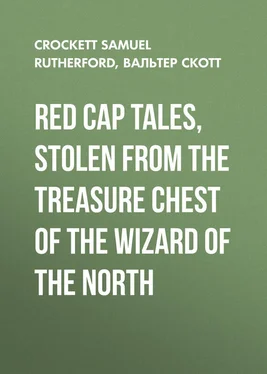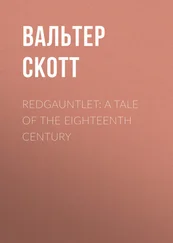Вальтер Скотт - Red Cap Tales, Stolen from the Treasure Chest of the Wizard of the North
Здесь есть возможность читать онлайн «Вальтер Скотт - Red Cap Tales, Stolen from the Treasure Chest of the Wizard of the North» — ознакомительный отрывок электронной книги совершенно бесплатно, а после прочтения отрывка купить полную версию. В некоторых случаях можно слушать аудио, скачать через торрент в формате fb2 и присутствует краткое содержание. Жанр: foreign_prose, foreign_antique, на английском языке. Описание произведения, (предисловие) а так же отзывы посетителей доступны на портале библиотеки ЛибКат.
- Название:Red Cap Tales, Stolen from the Treasure Chest of the Wizard of the North
- Автор:
- Жанр:
- Год:неизвестен
- ISBN:нет данных
- Рейтинг книги:4 / 5. Голосов: 1
-
Избранное:Добавить в избранное
- Отзывы:
-
Ваша оценка:
- 80
- 1
- 2
- 3
- 4
- 5
Red Cap Tales, Stolen from the Treasure Chest of the Wizard of the North: краткое содержание, описание и аннотация
Предлагаем к чтению аннотацию, описание, краткое содержание или предисловие (зависит от того, что написал сам автор книги «Red Cap Tales, Stolen from the Treasure Chest of the Wizard of the North»). Если вы не нашли необходимую информацию о книге — напишите в комментариях, мы постараемся отыскать её.
Red Cap Tales, Stolen from the Treasure Chest of the Wizard of the North — читать онлайн ознакомительный отрывок
Ниже представлен текст книги, разбитый по страницам. Система сохранения места последней прочитанной страницы, позволяет с удобством читать онлайн бесплатно книгу «Red Cap Tales, Stolen from the Treasure Chest of the Wizard of the North», без необходимости каждый раз заново искать на чём Вы остановились. Поставьте закладку, и сможете в любой момент перейти на страницу, на которой закончили чтение.
Интервал:
Закладка:
"And what," Edward suggested, "would become of pretty Alice then?"
"Alice is both canny and fendy," said the bold Evan Dhu, with a cock of his bonnet, "and I ken nocht to hinder me to marry her mysel'!"
Edward laughed and applauded the Highlander's spirit, but asked also as to the fate of the Baron of Bradwardine's cattle.
"By this time," said Evan, "I warrant they are safe in the pass of Bally-Brough and on their road back to Tully-Veolan. And that is more than a regiment of King George's red soldiers could have brought about!"
Evan Dhu had indeed some reason to be proud.
Reassured as to this, Edward accompanied his guide with more confidence toward the castle of Vich Ian Vohr. The "five miles Scots" seemed to stretch themselves out indefinitely, but at last the figure of a hunter, equipped with gun, dogs, and a single attendant, was seen far across the heath.
" Shogh ," said the man with the Lochaber axe, "tat's the Chief!"
Evan Dhu, who had boasted of his master's great retinue, denied it fiercely.
"The Chief," he said, "would not come out with never a soul with him but Callum Beg, to meet with an English gentleman."
But in spite of this prophecy, the Chief of Clan Ivor it was. Fergus Mac-Ivor, whom his people called Vich Ian Vohr, was a young man of much grace and dignity, educated in France, and of a strong, secret, and turbulent character, which by policy he hid for the most part under an appearance of courtesy and kindness. He had long been mustering his clan in secret, in order once more to take a leading part in another attempt to dethrone King George, and to set on the throne of Britain either the Chevalier St. George or his son Prince Charles.
When Waverley and the Chief approached the castle—a stern and rugged pile, surrounded by walls, they found a large body of armed Highlanders drawn up before the gate.
"These," said Vich Ian Vohr, carelessly, "are a part of the clan whom I ordered out, to see that they were in a fit state to defend the country in such troublous times. Would Captain Waverley care to see them go through part of their exercise?"
Thereupon the men, after showing their dexterity at drill, and their fine target-shooting, divided into two parties, and went through the incidents of a battle—the charge, the combat, the flight, and the headlong pursuit—all to the sound of the great warpipes.
Edward asked why, with so large a force, the Chief did not at once put down such robber bands as that of Donald Bean Lean.
"Because," said the Chief, bitterly, "if I did, I should at once be summoned to Stirling Castle to deliver up the few broadswords the government has left us. I should gain little by that. But there is dinner," he added, as if anxious to change the subject, "let me show you the inside of my rude mansion."
The long and crowded dinner-table to which Edward sat down, told of the Chief's immense hospitality. After the meal, healths were drunk, and the bard of the clan recited a wild and thrilling poem in Gaelic—of which, of course, Edward could not understand so much as one word, though it excited the clansmen so that they sprang up in ecstasy, many of them waving their arms about in sympathy with the warlike verses. The Chief, exactly in the ancient manner, presented a silver cup full of wine to the minstrel. He was to drink the one and keep the other for himself.
After a few more toasts, Vich Ian Vohr offered to take Waverley up to be presented to his sister. They found Flora Mac-Ivor in her parlour, a plain and bare chamber with a wide prospect from the windows. She had her brother's dark curling hair, dark eyes, and lofty expression, but her expression seemed sweeter, though not, perhaps, softer. She was, however, even more fiercely Jacobite than her brother, and her devotion to "the King over the Water" (as they called King James) was far more unselfish than that of Vich Ian Vohr. Flora Mac-Ivor had been educated in a French convent, yet now she gave herself heart and soul to the good of her wild Highland clan and to the service of him whom she looked on as the true King.
She was gracious to Edward, and at the request of Fergus, told him the meaning of the war-song he had been listening to in the hall. She was, her brother said, famed for her translations from Gaelic into English, but for the present she could not be persuaded to recite any of these to Edward.
He had better fortune, however, when, finding Flora Mac-Ivor in a wild spot by a waterfall, she sang him, to the accompaniment of a harp, a song of great chiefs and their deeds which fired the soul of the young man. He could not help admiring—he almost began to love her from that moment.
After this reception, Edward continued very willingly at Glennaquoich—both because of his growing admiration for Flora, and because his curiosity increased every day as to this wild race, and the life so different from all that he had hitherto known. Nothing occurred for three weeks to disturb his pleasant dreams, save the chance discovery, made when he was writing a letter to the Baron, that he had somehow lost his seal with the arms of Waverley, which he wore attached to his watch. Flora was inclined to blame Donald Bean Lean for the theft, but the Chief scouted the idea. It was impossible, he said, when Edward was his guest, and, besides (he added slyly), Donald would never have taken the seal and left the watch. Whereupon Edward borrowed Vich Ian Vohr's seal, and, having despatched his letter, thought no more of the matter.
Soon afterwards, whilst Waverley still remained at Glennaquoich, there was a great hunting of the stag, to which Fergus went with three hundred of his clan to meet some of the greatest Highland chiefs, his neighbours. He took Edward with him, and the numbers present amounted almost to those of a formidable army. While the clansmen drove in the deer, the chiefs sat on the heather in little groups and talked in low tones. During the drive , the main body of the deer, in their desperation, charged right upon the place where the chief sportsmen were waiting in ambush. The word was given for every one to fling himself down on his face. Edward, not understanding the language, remained erect, and his life was only saved by the quickness of Vich Ian Vohr, who seized him and flung him down, holding him there by main force till the whole herd had rushed over them. When Edward tried to rise, he found that he had severely sprained his ankle.
However, among those present at the drive , there was found an old man, half-surgeon, half-conjurer, who applied hot fomentations, muttering all the time of the operation such gibberish as Gaspar-Melchior-Balthazar-max-prax-fax!
Thus it happened that, to his great disappointment, Edward was unable to accompany the clansmen and their chiefs any farther. So Vich Ian Vohr had Edward placed in a litter, woven of birch and hazel, and walked beside this rude couch to the house of an old man, a smaller chieftain, who, with only a few old vassals, lived a retired life at a place called Tomanrait.
Here he left Edward to recruit, promising to come back in a few days, in the hope that by that time Edward would be able to ride a Highland pony in order to return to Glennaquoich.
On the sixth morning Fergus returned, and Edward gladly mounted to accompany him. As they approached the castle, he saw, with pleasure, Flora coming to meet them.
II. MISFORTUNES NEVER COME SINGLE
The Chief's beautiful sister appeared very glad to see Edward, and, as her brother spoke a few hasty words to her in Gaelic, she suddenly clasped her hands, and, looking up to heaven, appeared to ask a blessing upon some enterprise. She then gave Edward some letters that had arrived for him during his absence. It was perhaps as well that Edward took these to his room to open, considering the amount of varied ill news that he found in them.
Читать дальшеИнтервал:
Закладка:
Похожие книги на «Red Cap Tales, Stolen from the Treasure Chest of the Wizard of the North»
Представляем Вашему вниманию похожие книги на «Red Cap Tales, Stolen from the Treasure Chest of the Wizard of the North» списком для выбора. Мы отобрали схожую по названию и смыслу литературу в надежде предоставить читателям больше вариантов отыскать новые, интересные, ещё непрочитанные произведения.
Обсуждение, отзывы о книге «Red Cap Tales, Stolen from the Treasure Chest of the Wizard of the North» и просто собственные мнения читателей. Оставьте ваши комментарии, напишите, что Вы думаете о произведении, его смысле или главных героях. Укажите что конкретно понравилось, а что нет, и почему Вы так считаете.












